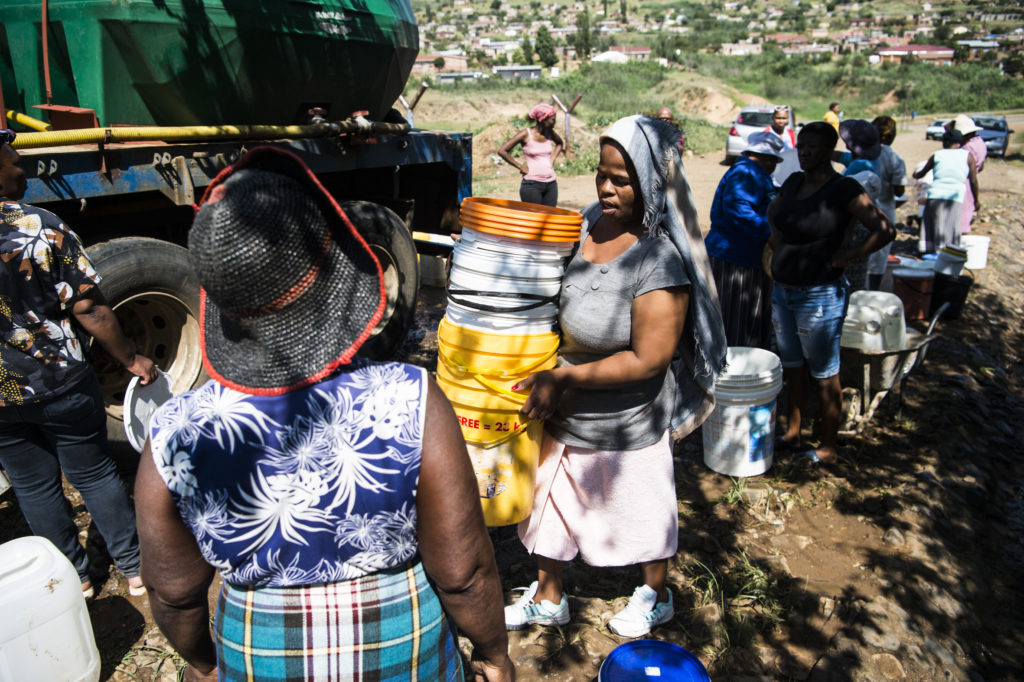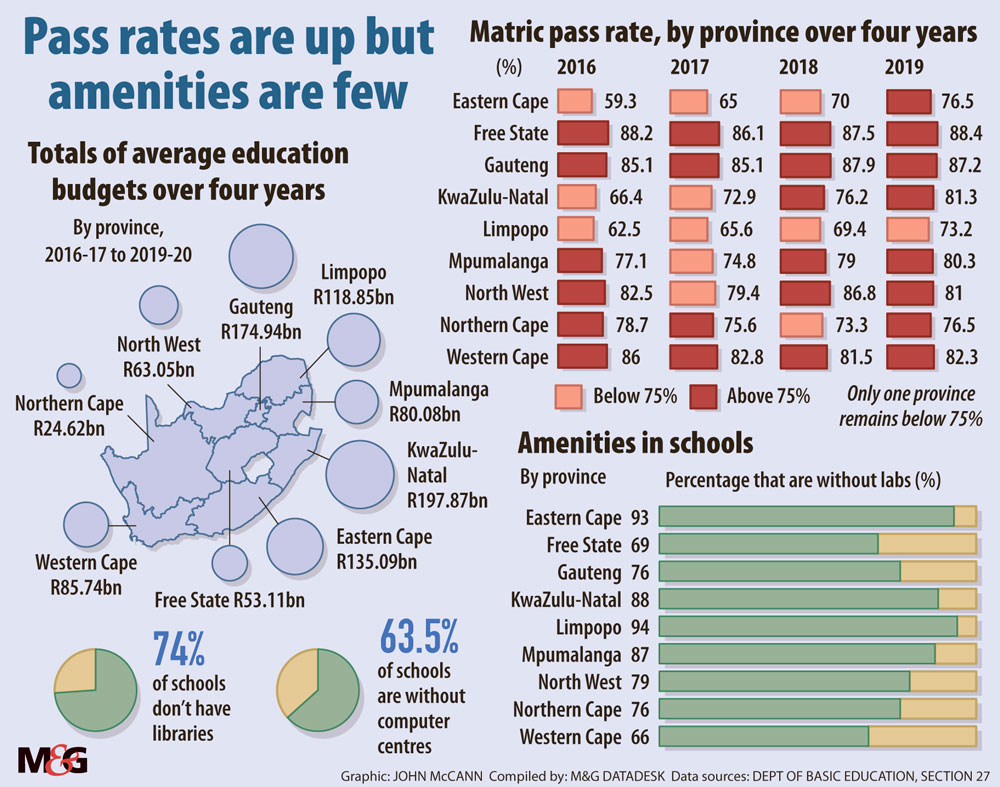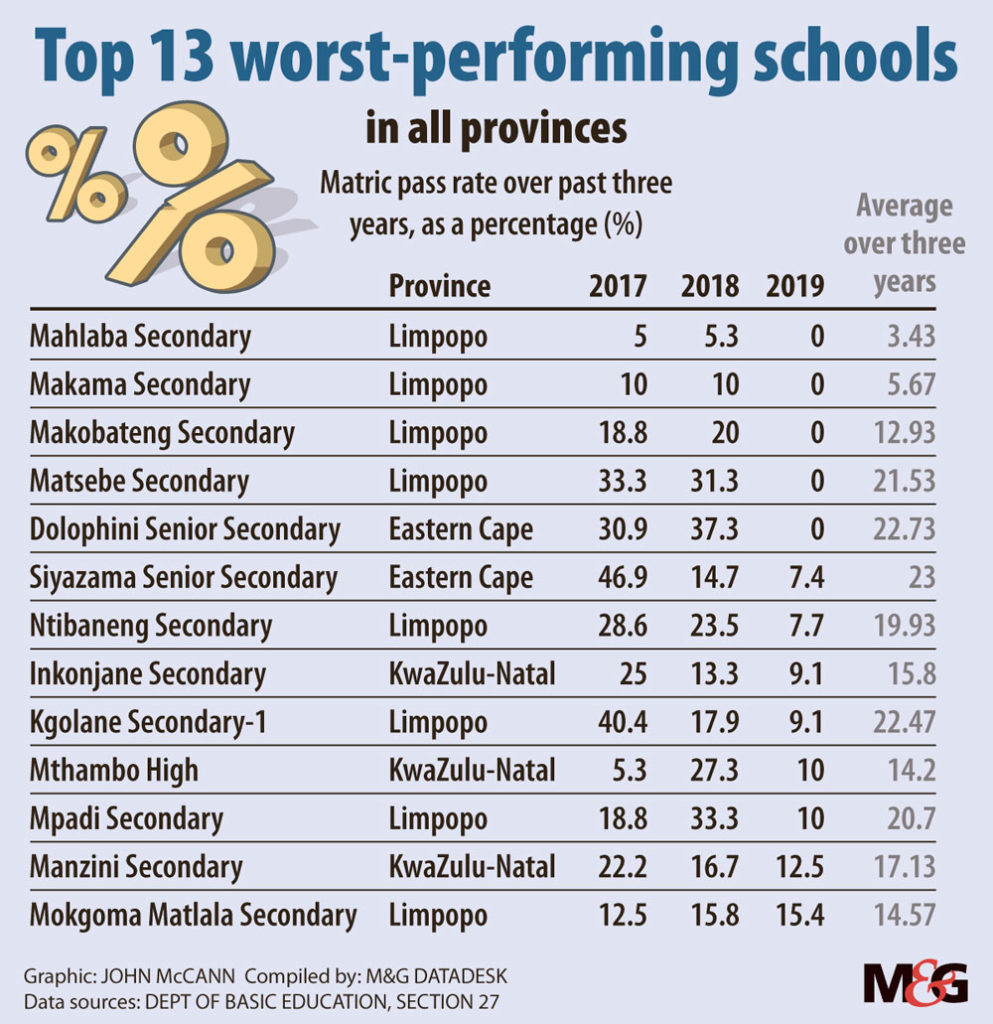Not a drop to drink: Residents in QwaQwa have not had water in their taps since October. Many have to walk long distances and stand in queues to purchase water from a water truck — if they can afford it. (Delwyn Verasamy/M&G)

Every drop of water counts in QwaQwa.
So when the Mail & Guardian visited the area this week and saw buckets lined up outside people’s doors to collect rainwater it was not an unusual sight.
The people of QwaQwa in the Maluti-a-Phofung municipality in the Free State have been experiencing a water crisis since 2016. The taps finally ran dry in October.
At the heart of the crisis is ageing water infrastructure, according to an April 2019 report by the department of co-operative governance and traditional affairs following a visit to that area by the then minister, Zweli Mkhize.
The situation is exacerbated by political instability in the municipality, maladministration, poor delivery of services, high levels of corruption, poor financial management and a R4-billion debt owed to Eskom. Last year the municipality’s chief financial officer and expenditure manager were arrested for fraud and corruption amounting to R4.6-million in a security tender.
The auditor general has not presented glowing reviews of the cash-strapped municipality, which was put under administration in 2018. In its 2017-2018 Consolidated General Report on the Local Government Audit Outcomes, the municipality was flagged as one of nine out of 23 municipalities whose audits had not been finalised by the cut-off date.
The report said this was because of late or nonsubmission of financial statements, among other factors.
This municipal failure manifests itself in other ways besides water shortages. In the central business district of Phuthaditjhaba — the main town in the area —roads are pockmarked with potholes and heaps of rubbish lie everywhere. In the suburbs, people have to make their own arrangements to discard waste.
 Those residents in QwaQwa who have money have purchased Jojo tanks to collect rainwater. (Delwyn Verasamy/M&G)
Those residents in QwaQwa who have money have purchased Jojo tanks to collect rainwater. (Delwyn Verasamy/M&G)
For two weeks in January, QwaQwa residents, fed up with not having water, took to the streets. Those protests and the lack of water meant learners attended only three days of school in January. Some residents home-schooled their children. But for others who did not have the capacity, this meant that children were left idle.
They went back to school on Monday. But schools rely on water tanks and this has compromised the hygiene in school toilets. Learners have to get water from the tanks to flush the toilets. When there isn’t water, going to the toilet becomes unpleasant.
Parents are also worried about the health of their children if they have to use unhygienic toilets. One local told the M&G: “My seven-year-old granddaughter came back from school one day without having eaten her lunch. She told me that she had gone to the toilet and was so disgusted by the faeces in the toilet that she could not eat. Imagine that.”
Locals also said that some schools ask learners to bring water to school. Another resident said: “I don’t trust the water from the Jojo tank. Do you know that someone can pour poison inside a Jojo tank and all our kids would die at school.”
Residents who have the means buy water to drink. Those with cars fetch water from neighbouring towns, which they use for cooking, flushing toilets and other chores.
Other residents and businesses have resorted to buying water tanks for their homes. Selling those tanks is a booming business.
Another lucrative business is owning a truck and selling water to businesses and residents who own tanks. Filling a Jojo tank from a water truck costs R350 for 1000 litres and R800 for 5000 litres. If people could buy water directly from the municipality, they would pay about R350 for 20000 litres of water.
For people who don’t have that much money, or access to water tanks, life becomes about waiting for the municipal water trucks. In Letshalemaduke village, the last time the water trucks visited was on January 2.
On Tuesday morning, a truck carrying 7500 litres of water arrived. But this was not enough. By the time the M&G reached the group of mostly women waiting for the truck, the water was finished and those who had not managed to fill their buckets and containers with water were left dejected.
 Metsi Matso Dam – According to a government report, ageing water infrastructure and political instability in the municipality are to blame. (Delwyn Verasamy/M&G)
Metsi Matso Dam – According to a government report, ageing water infrastructure and political instability in the municipality are to blame. (Delwyn Verasamy/M&G)
“Ausi, life is hard here. What must we do now? The water is finished and this Jojo is going back and will not come back again,” said a visibly frustrated woman.
“They have not delivered water since 2 January and when they do come, they come with little water. Why are we being treated like this, mara?”
The only option for those who did not receive water is to fetch it from a river or buy from one of the small bakkies that drive around selling water. A 20 litre container costs anything from R7 to R10.
The women do not work. Most of them survive on their children’s social grants and it is from this R420 a month that they now also have to budget money to buy water.
“I have taken my child out of creche because the money I paid to the creche for his school fees now has to buy water. Do you see how bad this situation is, mara ausi?”
Another woman said: “My child has to suffer and not get an education because we have to get water.”
About 5km from the first group of women — still in Letshalemaduke — another group of mostly young women line up their buckets and containers waiting for a truck to deliver water.
It was 11.30am when the M&G came across this group. They had been waiting since 8am.
 (John McCann/M&G)
(John McCann/M&G)
“When you see me here, ausi, I have not even cleaned my house. I rushed here thinking that maybe today a Jojo will come so we can get water,” said one woman.
The women told the M&G that the last time the water truck came to their area was on December 16. On January 4, residents forced a water truck to stop and managed to get water.
The women were joined by their small children while they waited. The children had composed a song and chanted “Jojo, Jojo, Jojo” in anticipation of a water truck’s arrival.
“I stay with my sickly, elderly parents who defecate on themselves and this means I have to do their washing everyday. But how can I do that without water?” asked another woman.
These women said they are now scared of fetching water from the river or sending their children there to collect it. This is after an eight-year-old girl drowned while fetching water from a river recently.
The women said their lives have been hell since not having water. Their situation is compounded by the fact that they are poor and cannot afford to buy water.
“We might as well prostitute ourselves to the men driving the Jojo trucks to get water because, honestly, we cannot live like this,” said a young woman.
She is serious. She told the M&G about rumours that the men who drive the water trucks say the reason why people in her part of the village are not receiving water is the women do not want to give their phone numbers to them.
“Other women are clearly giving out their numbers and that is why their areas maybe do get water. We must sleep with these men then.”
These are the calculations that people in QwaQwa are forced to make.
But it does not have to get to this if the government sticks to the intervention plans it has for the area.
During the January protests, Water and Sanitation Minister Lindiwe Sisulu visited the area and, among other interventions, she promised that 5000 water tanks would be provided within seven days to ensure that all households have a tank.
She also promised that the department would investigate new technology that can assist with mitigating the water problems in the province.
But, on Monday no water tanks arrived. Instead, five water trucks were delivered to the municipal offices.
 (John McCann/M&G)
(John McCann/M&G)